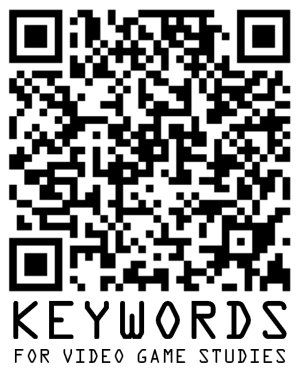 Starting this fall quarter at the University of Washington (UW), a new graduate interest group (GIG) sponsored by the Simpson Center for the Humanities will host a school-year long series of workshops and colloquia on video games. The major players behind the Keywords for Video Game Studies working group consists of six graduate students representing four campus departments and grew out of the collective work of the Critical Gaming Project at UW (https://depts.washington.edu/critgame/wordpress/), a community of undergraduates, grads, and faculty interested in playing, studying, and teaching games. The Keywords participants are Edmond Chang (English), Timothy Welsh (English), Terry Schenold (English), Theresa Horstman (Education), Megan Bertelsen (Comparative Literature), and Michael Barthel (Communication). In addition to funding the GIG, the Simpson Center has also nominated all six of the Keywords group as HASTAC Scholars for the 2010-11 year. HASTAC or Humanities, Arts, Science, and Technology Advanced Collaboratory, is a consortium of scholars, artists, scientists, social scientists, and engineers from over a hundred institutions and organizations committed to collaboration, critical thinking, and creative uses of technology. This year, the Simpson Center wanted to nominate a cohort of Scholars formed around a focused line of inquiry and the Keywords for Video Game Studies graduate interest group seemed a perfect match.
Starting this fall quarter at the University of Washington (UW), a new graduate interest group (GIG) sponsored by the Simpson Center for the Humanities will host a school-year long series of workshops and colloquia on video games. The major players behind the Keywords for Video Game Studies working group consists of six graduate students representing four campus departments and grew out of the collective work of the Critical Gaming Project at UW (https://depts.washington.edu/critgame/wordpress/), a community of undergraduates, grads, and faculty interested in playing, studying, and teaching games. The Keywords participants are Edmond Chang (English), Timothy Welsh (English), Terry Schenold (English), Theresa Horstman (Education), Megan Bertelsen (Comparative Literature), and Michael Barthel (Communication). In addition to funding the GIG, the Simpson Center has also nominated all six of the Keywords group as HASTAC Scholars for the 2010-11 year. HASTAC or Humanities, Arts, Science, and Technology Advanced Collaboratory, is a consortium of scholars, artists, scientists, social scientists, and engineers from over a hundred institutions and organizations committed to collaboration, critical thinking, and creative uses of technology. This year, the Simpson Center wanted to nominate a cohort of Scholars formed around a focused line of inquiry and the Keywords for Video Game Studies graduate interest group seemed a perfect match.
The Keywords for Video Games working group brings together interdisciplinary perspectives and scholarship on video games. Our working group hopes to bolster critical engagement with video games and video game culture to address: the design of games (as computational, protocological, rhetorical, and aesthetic artifacts); the theorizing of games (looking at narrative, interactivity, race/gender/sexuality); and the pedagogical and political potential of games. For more information, please visit: http://depts.washington.edu/uwch/projects_1011_Keywords_Video_Game_Studies.php
The Keywords events are open to undergraduates, grads, faculty, staff, and the UW community. The workshops/colloquia for Autumn Quarter are:
“PLAY” (Inaugural Meeting)
Wednesday October 13 2010 at 3:30 PM
Simpson Center Conference Room, CMU 202, UW Seattle
According to the Entertainment Software Association??s 2010 industry report: 1) U.S. computer and video game software sales grew 22.9 percent in 2008 to $11.7 billion, more than quadrupling industry software sales since 1996, 2) Sixty-eight percent of American households play computer or video games, 3) The average game player is 35 years old and has been playing games for 12 years, and 4) Sixty-three percent of parents believe games are a positive part of their children??s lives. Given these statistics, are video games finally an “art form for the digital age” as Henry Jenkins argued back in 2000? Jenkins thinks so saying, “Video game shape our culture. It’s time we took them seriously.” Clearly we take them seriously in terms of our pocketbooks, our avocations, and our time, but can we take them seriously as objects of study? Can something we call “play” be serious, critical, even political? For our inaugural session, we will engage and attempt to define play drawing on key video game scholarship including Johan Huizinga, Roger Caillois, Jesper Juul, and Alexander Galloway. Moreover, we will look at games like Zynga’s Farmville, Michael Mateas and Andrew Stern’s Facade, and Sony’s Star Wars Galaxies.
“IMMERSION/INTERACTIVITY”
Wednesday November 10 2010 at 3:30 PM
Simpson Center Conference Room, CMU 202, UW Seattle
In 2006, Nintendo introduced the Wii by promising “a new immersive playing experience” resulting from its revolutionary motion-control system. Three years later, Microsoft’s Kinect eliminates the controller all together, claiming to offer “no barriers” between players and virtual environments. The marketing of the motion-control revolution expresses the common assumption that immersion is a problem of interactivity: if the technology would just “get of your way” you would feel like you’re really there. But is the relationship between immersion and interactivity really that simple? If so, how could anyone get lost in as clunky an interface as a book? Is it feasible to make the implementation media transparent? Would it even be desirable to do so? This second session of the Keywords for Video Gaming working group will look at the relationship between immersion and interactivity in the context of video game studies. We will read Marie-Laure Ryan’s influential work defining immersion and interactivity as oppositional forces, Katie Salen and Eric Zimmerman’s concept of the immersive fallacy, Espen Aarseth’s ergodic literature, and Jenova Chen’s experiments with “flow” in games. To demonstrate these theories, we will play with the Wii and Chen’s game, flOw, as well as discuss the meta-immersion masterpiece Psychonauts.